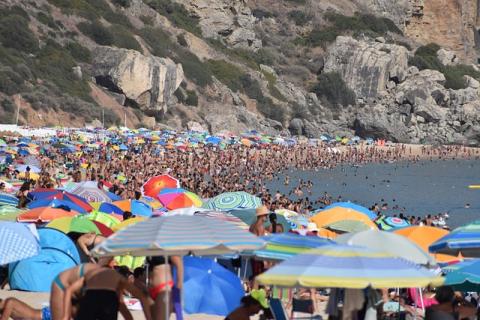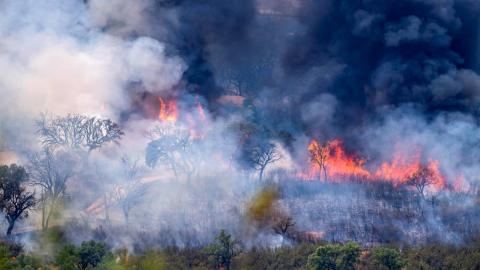What is heat stroke?
It is a disorder caused by excess heat in the body, usually due to prolonged exposure to high temperatures or physical exertion in these extremely hot conditions, as indicated by the Mayo Clinic. It is the most severe form of heat injury and can occur if the body temperature reaches or exceeds 40 °C (104 °F).
Heat stroke, also known as heatstroke, requires emergency treatment because, if left untreated, it can quickly damage the brain, heart, kidneys and muscles. The damage worsens the longer treatment is delayed, increasing the risk of serious complications or even death.
What symptoms appear with this disorder?
Any of the following signs may be present:
- Elevated body temperature: of 40°C or higher.
- Altered mental status or behaviour: confusion, agitation, slurred speech, irritability, delirium, convulsions or fainting may be the result of heat stroke.
- altered sweating
- onset of nausea or vomiting.
- reddening of the skin due to increased body temperature
- breathing faster than normal
- rapid heart rate
- Severe headache, which may include palpitations.
What to do in the event of heat stroke?
The first thing to do is to call 112, as this is an emergency. The Ministry of Health recommends that, while the medical team arrives, we move the person who has suffered heat stroke to a cool place. It is also advisable to help lower the temperature with cold cloths or a cold water bath. In case of severe symptoms, the information from the ministry advises against giving any kind of drink.
The symptoms of heat stroke may be somewhat different from those of heat exhaustion
As we have said, heat stroke is the most acute form of heat injuries, which also include exhaustion due to high temperatures. The Ministry of Health reminds us of the symptoms of this other, milder but also important disorder:
- Headache.
- Nausea.
- Dizziness.
- Vomiting.
- Tiredness.
- sweating
- cold, pale, clammy skin
- rapid, weak pulse
- Fever below 40°C.
How to deal with heat exhaustion?
If you notice any of the above symptoms, these recommendations can help you recover and prevent the condition from worsening:
- Sip water.
- Go to a cool place.
- Loosen your clothes.
- Put on cold cloths or take a cold bath.
- Seek medical assistance in the following cases:
- History of chronic illness.
- Presence of vomiting.
- Symptoms worsen for more than one hour.
Who are the people most susceptible to heat disorders?
Although extremely high temperatures affect the entire population, some groups are more susceptible to damage and should take extreme precautions. These are pregnant women, infants and children under 4 years of age, the over 65s, athletes and people who work outdoors in the middle of the day, people with limited autonomy and chronic patients (with cardiovascular or respiratory diseases, obesity or diabetes).
Also at risk, according to the Ministry of Health, are people living in dwellings that are difficult to cool, in vulnerable conditions or in highly urbanised environments with little vegetation. In addition, some medicines and alcohol and other drugs make hydration difficult.
Recommendations to avoid heat damage
To minimise the damage caused by excessive temperatures, the Ministry of Health has published the following recommendations:
- Drink water and liquids frequently, even if you are not thirsty and regardless of the physical activity you are doing.
- Avoid caffeinated, alcoholic or very sugary drinks, as they can lead to dehydration.
- Stay as long as possible in cool, shady or air-conditioned places and cool down whenever necessary, avoiding the hottest hours outdoors.
- Reduce physical activity and avoid outdoor sports in the middle of the day.
- Wear light, loose-fitting, breathable clothing. Wear a hat and sunglasses.
- Never leave anyone in a parked and locked vehicle (especially minors, elderly or chronically ill people).
- Consult a health professional in case of symptoms that last more than one hour and that may be related to high temperatures.
- Keep medicines in a cool place; heat can alter their composition and effects.
- Eat light meals to help replenish salts lost through sweating (salads, fruit, vegetables, juices, etc.).




